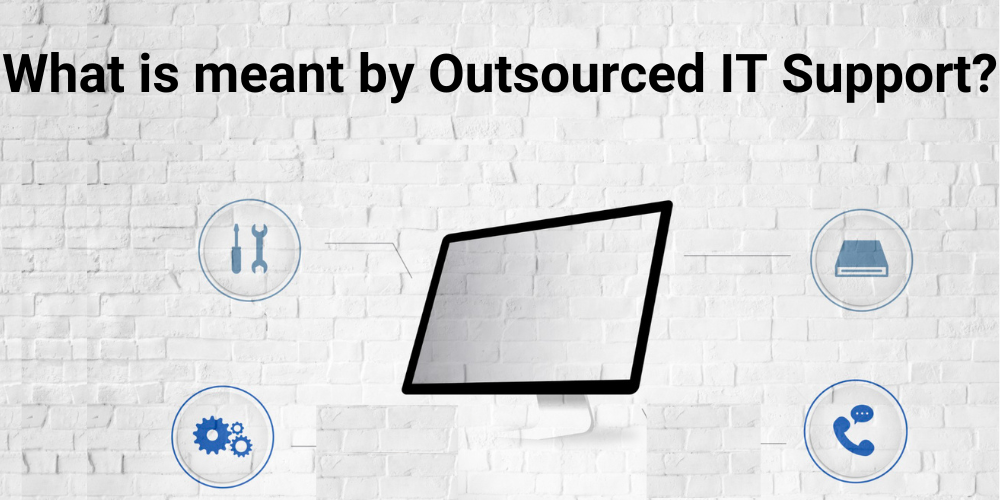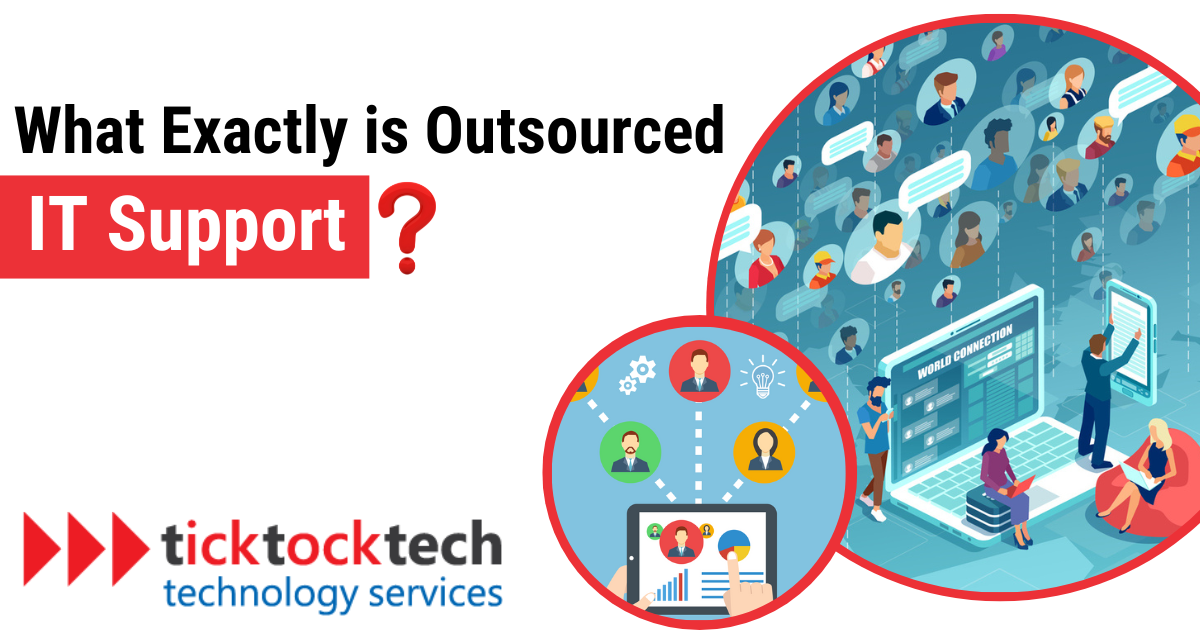When it comes to managing your IT needs, have you ever considered outsourcing? If you’re curious about what exactly outsourced IT support entails, you’ve come to the right place.
What is meant by Outsourced IT Support?
Outsourced IT support means you can bring in an external agency or service provider to manage and maintain your company’s IT systems. This type of support includes a wide range of services, such as software and hardware maintenance, cybersecurity, and telecommunications.
By outsourcing your IT needs, you can access professional IT support without the need to invest in an in-house IT team. This can be particularly beneficial for smaller businesses that may not have the resources to hire a dedicated IT staff.

Outsourced IT support can be tailored to your needs, whether you prefer in-person or virtual support, allowing you to choose the type of support that best suits your company’s requirements and budget.
Furthermore, IT outsourcing is crucial to your company’s ability to scale its operations. External IT teams can help facilitate dynamic business changes and provide the necessary support to ensure that your IT systems can keep up with your growth.
Regardless of the type of IT support you require, if an external agency provides it, it is considered outsourced IT support. This type of support can help you save time and money while ensuring that your IT systems are running smoothly.
Common Outsourced IT Support Services
Outsourced IT support covers many services to meet the technology needs of businesses. These services can be customized based on individual requirements. Here are some key services:
Cyber Security
When it comes to cyber security, you’ll find that 99% of organizations have outsourced at least one part of their cyber security workload. This isn’t surprising, as it is one of the most commonly outsourced elements in IT support. Cyber security is critical to your company’s IT network, requiring constant management and observation. Issues or gaps can make a significant difference, so it’s crucial to stay vigilant.
IT support for cyber security involves many aspects, such as training team members through user awareness sessions to identify possible threats. Additionally, it includes providing support to achieve and maintain security compliance, carrying out security risk assessments and penetration testing, and dealing with phishing and scam alerts.
Daily IT Support
Daily IT Support is a comprehensive service that ensures the smooth operation of a business. It encompasses tasks such as troubleshooting issues and providing exceptional customer support services. Skilled IT professionals efficiently handle these tasks, minimizing disruptions and ensuring optimal performance. They troubleshoot and resolve technical issues, including software glitches and hardware malfunctions.
Customer support is a priority, assisting clients with inquiries, concerns, and technical difficulties. Also, the service includes seamless onboarding, setting up user accounts, and granting access to essential systems and resources. It extends to team support, optimizing collaboration, and productivity through assistance with network connectivity, software configurations, and technical guidance.
The service also covers software and application support, responsive help desk assistance, and comprehensive documentation and training materials to empower users. With Daily IT Support, businesses can rely on a glitch-free operation and a reliable technology infrastructure.
Cloud Optimization
The cloud offers numerous benefits, including facilitating global collaboration, reducing costs, and improving data sharing. However, it also introduces new security risks that must be managed effectively.
IT outsourced support can help businesses implement secure cloud networks that minimize these risks. Managed Service Providers (MSPs) can design and implement customized cloud systems that cater to the unique needs of each business. By connecting employees, improving data sharing security, and creating centralized systems, MSPs can help achieve scalable operations.
Telecoms
Telecoms support is one of the most common forms of hardware and software assistance offered by IT service providers. They help businesses stay up-to-date with the latest communication tools and technologies.
IT service providers also work proactively to resolve technical issues, minimizing downtime and ensuring businesses continue operations without interruptions. By doing so, they help companies maintain a strong reputation and avoid potential losses resulting from communication disruptions.
What are the benefits of Outsourced IT Support?
Outsourced IT support offers several benefits for businesses. Here are some of the key advantages:
Improved Business Focus
Outsourcing IT services allows companies to free up resources, such as personnel and finances, which can be redirected towards achieving business goals. By entrusting the work to a reliable IT outsourcer, company leaders can focus on improving production schemes, trade, logistics, marketing, and other areas with confidence. In other words, outsourcing enables businesses to concentrate on their core competencies and make better strategic decisions.
Decreased Threats to Security
Outsourcing IT can decrease security threats as managed service providers are well-versed in handling cybersecurity risks. Companies often store sensitive data, making them vulnerable to security breaches that can result in stolen, deleted, or altered data. Such breaches can lead to lawsuits and loss of trust, especially if client or patient data is compromised.
However, outsourced IT providers have the expertise to protect against such threats. They understand how hackers are stealing critical data and login credentials, and they can provide 24/7 monitoring to quickly resolve any issues. In addition, they offer staff cybersecurity training to minimize the risk of human error, which is often a significant factor in security breaches.
Increased Economic Efficiency
Outsourcing IT can lead to increased economic efficiency by allowing companies to focus on their core business activities. By transferring IT functions and processing to an external provider, companies can reduce the time spent on non-core tasks and allocate more resources to revenue-generating activities. This shift in focus can lead to increased productivity, as time is spent on activities that directly contribute to the bottom line. In addition, the IT provider can ensure that the IT infrastructure supports the company’s business units efficiently.
Frequently Asked Questions
Traditional IT support relies on an in-house team to handle all IT tasks, while outsourced managed IT services are provided by an external company. These external companies use their expertise, technology, and resources to deliver services that often exceed what a single in-house team can achieve.
Absolutely, in most cases, outsourcing IT services is cost-effective. You also save on the expenses related to hiring, training, and retaining an in-house IT team.
Conclusion
Incorporating managed outsourced IT services into your company’s strategy is essential in today’s technology-driven world. Managed outsourced IT services offer numerous benefits, including access to the latest technologies, improved efficiency, and cost savings. By partnering with a reliable managed service provider like TickTockTech, you can ensure a smooth transition to outsourcing your IT services.

